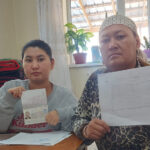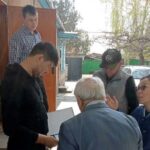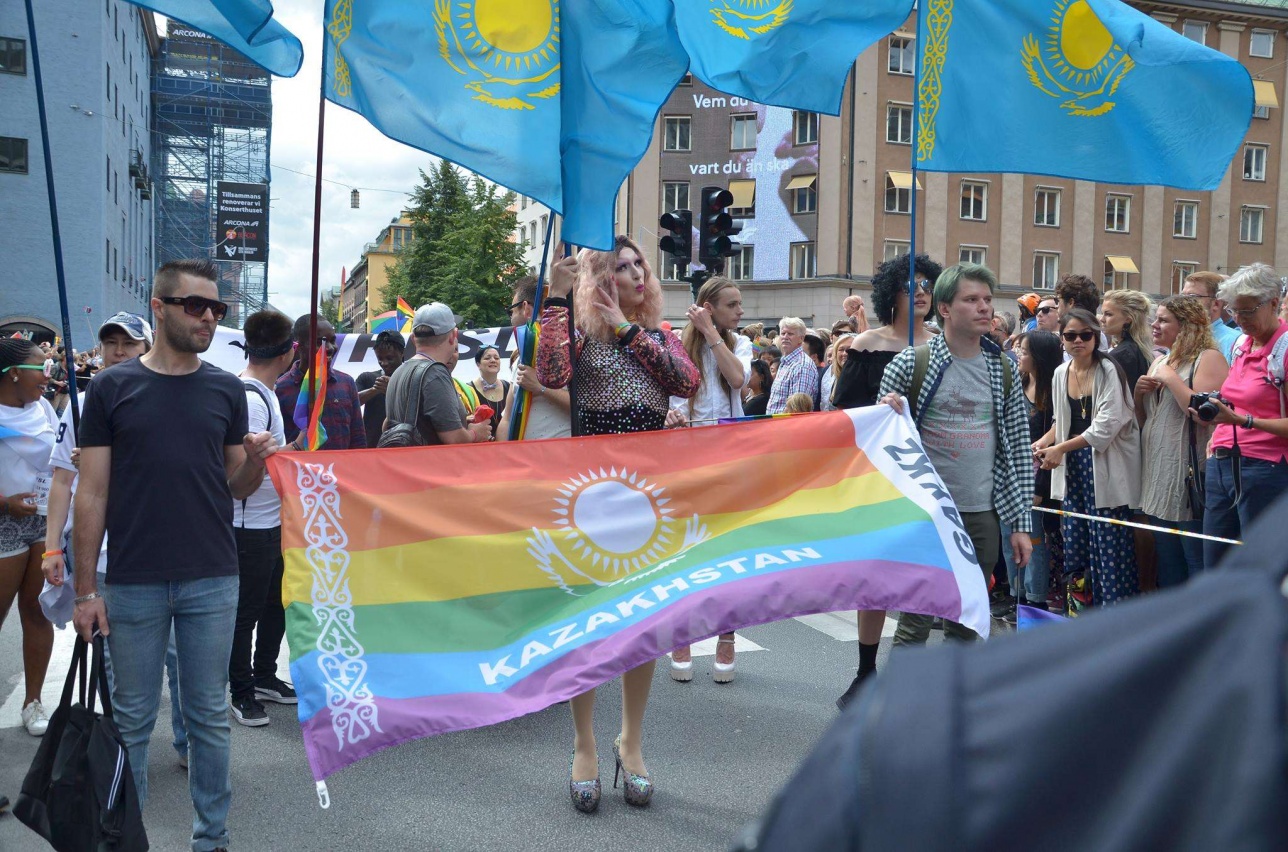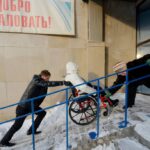The shocking murder of 15 soldiers in
On this December day, 20-year-old soldier Vladislav Chelakh is standing in the glass cage used for defendants listening to a verdict being pronounced against him. Judge Erbol Akhmetzhanov speaks for only 10 minutes, but his words have an effect on the entire country.
Akhmetzhanov reads off the articles in the criminal code under which the slight young man in the black Armani shirt is being convicted: “murder, theft, betrayal of state secrets, misappropriation of weapons, malicious destruction of military property, desertion.” The sentence isn’t surprising: life imprisonment in a labor camp. “There are no mitigating circumstances,” Judge Akhmetzhanov says.
Chelakh was accused of killing 14 fellow border guards and a hunter at a remote post on the Kazakh-Chinese border. Four years ago, he would have been sentenced to death, but
It’s a miracle that Chelakh is even alive to hear the verdict. In October, he tried to hang himself with a tracksuit bottom tied to his cell window. A month later, guards saved him after he sliced open an artery with a sharp piece of plastic.
“They did everything to get to me, but they didn’t search for the truth,” Chelakh said a few days before his sentencing. Since then, he has remained silent.
It’s a different story with his mother, Svetlana Vaschenko. “He is innocent,” she shouted as uniformed guards pulled her son out of the courtroom. “This trial proves that
The Taldykorgan trial, the most spectacular to date in the history of the young nation of
There is a different dynamic outside the courtroom, in Kazakh living rooms, on the street and on the Internet, where the Kazakh people clearly oppose their government — and don’t put anything past it, even if it entails covering up a mass murder. This widely held belief has led most Kazakhs to side with Chelakh. One blogger predicted that powerful men will eventually kill Chelakh “after an alleged escape attempt, so as to eliminate the last witness to this massacre.”
The case “is a reflection of our government system,” says Guljan Yergalieva, a prominent opposition journalist. “They provoke, they falsify and they lie. The people in power here have behaved suspiciously from the very start.”
Chelakh’s is the story of a country blessed with gold, oil, natural gas and uranium, almost eight times the size of
A Grisly Massacre
It was a warm day on May 10, 2012, when 14 soldiers and a captain set off for Arkankergen, a post on the Chinese border that is high in the
Communication with the post was broken off on May 28, and a search team was dispatched two days later. When the men arrived, they encountered a horrific scene.
The Arkankergen post was no longer there. Almost everything had been burned down, including the wooden buildings housing the soldiers, the officers’ quarters and the other service structures. The team found the remains of 13 soldiers in the ashes and another body on the banks of a nearby stream. Some
On June 4, another team found Chelakh, then
Chelakh reportedly said that unknown assailants had attacked the border post at
But who committed the attack? People coming from the Chinese side of the border? The Kazakhs have a deep-seated fear of the Chinese, and Arkankergen is in an area in which the Soviet Union and
Or did drug traffickers attack the post? A synthetic drug known as krokodil, or “crocodile,” 10 times stronger than morphine, is reportedly smuggled into the country via the nearby
Or was it Islamists using the Arkankergen murders to send a message? Radical imams control the mosques in many cities in the south, and last year supposedly quiet
And now there is Arkankergen, which President Nazarbayev initially described as an “act of terror.” First he announced a day of national mourning, and then he sacked and replaced the head of the country’s border guard.
It took only six days for the authorities to announce that the sole survivor, Chelakh, had confessed to the murders — all 15 of them.
Suspicious Explanations
A video of this confession was posted online even before the preliminary investigation had been completed. It couldn’t have come from anyone but the Kazakh intelligence service.
“I was humiliated and insulted throughout my entire term of service,” Chelakh says in the video. “The last straw came when Kambar Aganas, a soldier, tried to hit me just because I woke him up for guard duty.” He was beside himself, Chelakh says in the video. Then he says he went to the weapons storage room and grabbed two AK-47 assault rifles, 50 rounds and a Makarov pistol.
First, he says in the video, he killed Aganas with a shot to the back of the neck, and then he murdered the rest as they lay in their beds. The captain was hiding behind a door, so he shot him through the door. Finally, he says, he walked over to the forestry business, killed the hunter with a volley of shots and then set the barracks on fire. He claims that he committed the crimes in a “state of disorientation.”
The mass murder on the border soon became the most important topic of conversation in
Still, Kazakh experts found many inconsistencies in Chelakh’s account. It was written in words that a confused killer would hardly have used, and there were many conflicting details. The experts also concluded that it would be almost impossible to shoot and kill a dozen men without any of them trying to flee.
There were other contradictions relating to when things happened, the weapons used and the ammunition. Residents of a nearby village reported seeing strangers at the time of the killings. Why didn’t Chelakh flee across the Chinese border? And why did the president replace the head of the border guard after the massacre?
A newsreader at Channel
Chelakh himself soon recanted his confession, claiming that his interrogators had dictated it to him. He said that they had threatened him with rape and promised him a mild sentence if he pled guilty. He identified the interrogators in a police line-up.
Good Neighbors
Chelakh is from Karagandy, an unattractive city on the Kazakh steppes, where temperatures fall to minus 40 degrees Celsius (minus 40 degrees Fahrenheit) in the winter and climb to 40 degrees Celsius in the summer. There were once close to 100 coal mines in the region, as well as many steel mills where gulag inmates worked at the behest of former Soviet dictator Joseph Stalin. In 1995, when Indian billionaire Lakshmi Mittal acquired the most important steel mill, he closed most of the coal mines.
Chelakh grew up in one of the drab developments on the city’s outskirts, where his mother Svetlana still lives today. She is a simple 39-year-old woman who worked as a sales clerk before becoming a taxi driver. Of course she doesn’t believe that her son is guilty. What mother would? His letters, which she fetches from a cabinet, speak for themselves. “I was lucky,” he wrote in the awkward handwriting of a 19-year-old, “because I get along well with everyone. The officers are okay.” There is no mention of the brutal army hazing ritual known as “dedovshchina,” in which older soldiers bully younger conscripts.
“He once wanted to become a locomotive engineer,” his mother says, “but after the conscription meeting with the military commission, he dreamed of a career with the KNB.” The boy thought it was a good sign that he had received a draft notice saying he would be assigned to the KNB’s border guard division.
“The whole thing is made up,” says Vladimir, Chelakh’s 69-year-old grandfather. “They’re protecting the higher-ups and destroying the evidence.” When asked if the neighbors have shunned the family since learning of Chelakh’s suspected involvement in the mass murder,
When they were unable to secure train tickets to Almaty, he says, the station manager got them the tickets himself. “Synok, my boy,” the manager reportedly said, “everyone here knows that your grandson is innocent.”
Why would a large percentage of the population believe that Vladislav Chelakh is innocent without knowing the details of the massacre in the
“People are willing to believe anything, just not the official viewpoint,” says Sergei Perchalsky, a local journalist in Karagandy who is familiar with both sides: the people and the regime. He suggests we meet at an inconspicuous cafй in the center of town.
“In his need for admiration, Nazarbayev announces a new victory every day. He brought the OSCE summit and the Asian Winter Games to
“Some 10,000 people are waiting for apartments in Karagandy, while government officials are selling off housing,” Perchalsky says. “Construction contracts can only be secured with substantial bribes, and when the interior minister recently visited the city, every policeman had to spend $200 for a suitable gift for the visiting dignitary — unofficially, of course.”
Members of the political elite tend to use weapons to settle disputes and get rid of members of the opposition. Nazarbayev’s former son-in-law is suspected of involvement in several murders, and a former prime minister has fled the country.
“You can buy anything in
Alarming Incidents
Serik Sarsenov, Chelakh’s 60-year-old attorney, has been practicing for a long time. He has defended journalists and participated in political murder trials. He spent 20 years with the police’s criminal investigation division, and he is all too familiar with how the police and the courts operate. And now he is defending Chelakh.
Sarsenov was given 40 hours to read the 53 binders of documents. And then the court denied all of his motions. He summoned witnesses, called for expert witnesses and requested the release of classified files. But it was all in vain. “This system,” says Sarsenov, “is like a cancer that has formed metastases everywhere.”
But if Chelakh is innocent, what happened at the Chinese border?
Journalist Guljan Yergalieva knows what they’re saying in political discussion groups in Almaty. The government has banned her newspaper, Svoboda Slova (“Freedom of Speech”), her website guljan.org was shut down in December, and tax investigators have searched her house.
“The last few months have been the worst in
“The people surrounding Nazarbayev are terrified that they could lose control of the country,” Yergalieva continues. They don’t understand why the 72-year-old president is playing his wealthy daughters, sons-in-law and government officials off each other rather than designating a successor. “They want to force him out of office, like (former Soviet leader Nikita) Khrushchev or (former Russian President Boris) Yeltsin, by proving that Nazarbayev can no longer guarantee the stability of
Still, perhaps something much simpler was behind the murders. Could border officials have been trying to cover up some sort of illegal dealings in the mountains? Or was the massacre the work of the intelligence service?
Those who had previously dismissed such explanations as conspiracy theories may have changed their tune after Dec. 25, when a military aircraft crashed near Shymkent in southern
The new director had been trying to reform the corrupt agency. The plane, an Antonov An-72, is considered a reliable aircraft and had just been serviced. It was already a ball of flames when it crashed, as if there had been an explosion on board.
SOURCE:
Spiegel

















